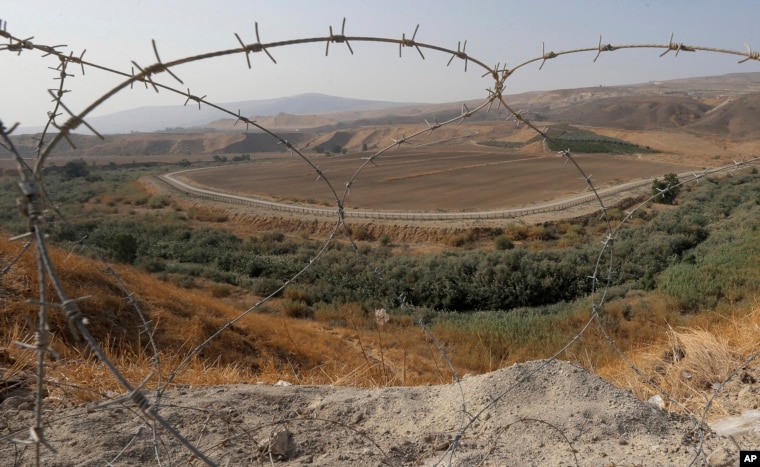
Weighing the solutions
The ups and downs of the one-state, two-state and three-state proposals to resolve the Israeli-Palestinian conflict
Beginning in the 20th century, the international community faced the question of how to divide the former Ottoman territory of Palestine between its Arab and Jewish residents. The formation of Israel as the first Jewish state in 1948 led to a series of expulsions and conflicts with its neighbors that would ultimately determine the country’s de facto territory. As the extent of these borders has been disputed and Palestinian Arabs have remained without a sovereign state, numerous solutions have been promoted to resolve the conflict. We take a look at the most common proposals and the arguments presented in favor of each, as well as the challenges they present.

Two-State Solution
(Illustrations by Walid Haddad/VOA News)
The 1948 United Nations Partition Plan for Palestine envisioned two sovereign states, with approximately 56% of the territory allocated to a Jewish state, and the remainder to a Palestinian state, as well as a special international status for the city of Jerusalem.
Arab leadership rejected the proposal as being unfair to the majority-Palestinian population. During the ensuing armed conflict, many Palestinians in Israeli territory were expelled or fled to the Gaza Strip and the West Bank, which were occupied by Egypt and Jordan before Israel gained control of them in a 1967 war. These noncontiguous territories have since formed the main basis for negotiations regarding a future Palestinian state.
The two-state solution
Lebanon
Mediterranean Sea
Israel
Golan
Heights
Jordan
Syria
Egypt
Saudi Arabia
Palestine
Jerusalem
Arguments in favor
Widely seen as the most realistic plan for peace and is officially endorsed by most of the international community, as well as U.S. leadership.
Would maintain Israel’s unique character as the world’s only Jewish state.
Fulfills Palestinian national aspirations and self-determination with an independent and sovereign Palestinian state consisting of the West Bank and the Gaza Strip.
Challenges
Since gaining control of the West Bank, Israel has built settlements there in contravention of U.N. resolutions, leaving up to 10% of the hypothetical Palestinian territory crisscrossed by Jewish-populated areas and their infrastructure.
Israeli settlers and large parts of the Israeli public oppose any plan to transfer the land to Palestinian control or dismantle the settlements, though some proposals suggest compensating Palestinians through land swaps of other Israeli territory.
While majority-Arab East Jerusalem has been envisioned as the capital of a future Palestinian state, successive Israeli leaders have opposed any plan for the division or shared control of Jerusalem, and Israel has adopted a law declaring Jerusalem to be its “eternal and indivisible” capital.
Does not directly address the “right of return” for Palestinians whose families fled or were expelled from what is now Israeli territory between 1948 and 1967 — a primary demand of the Palestinian movement that has been backed by U.N. resolutions.
Israeli security demands, resulting from decades of terrorist attacks inside Israel by Palestinians based in the West Bank and Gaza, may be incompatible with a fully sovereign Palestinian state.

“It is long past time to move in a determined, irreversible way toward a two-state solution, on the basis of United Nations resolutions and international law, with Israel and Palestine living side-by-side in peace, and security, with Jerusalem as the capital of both states.”
— António Guterres, United Nations Secretary-General

One-state solution (binational)
(Illustration by Walid Haddad/VOA News)
The most common alternative to the two-state solution is that of a single binational state on the territory of the former British Mandate for Palestine, with equal civil and political rights for all its residents.
Such an arrangement had been proposed by some Jewish and Arab leaders prior to the establishment of Israel and continues to be favored by many academics and activists. Long seen as unrealistic, the so-called “one-state” solution has been growing more popular among Palestinians and is being taken more seriously, as little progress has been made toward a two-state solution. Continued construction of Israeli settlements has reduced the viability of a future Palestinian state.
The one-state (binational) solution
Lebanon
Mediterranean Sea
Israel/
Palestine
Golan
Heights
Jordan
Syria
Egypt
Saudi Arabia
Jerusalem
Arguments in favor
A unified pluralistic state is seen by many activists as the best way to satisfy the principle of granting full democratic rights to all residents of Israel and Palestine without privileging any religion or ethnicity.
Would not require the dismantling of existing settlements or any further population transfers, and would retain Jerusalem as an undivided capital.
Opens the door to resolving the Palestinian right of return by granting citizenship to all Palestinians, who would then be able to return to their family homes or seek compensation if the property is no longer recoverable.
Challenges
Opposed by many Israeli political leaders and Jewish organizations on the basis that it would effectively eliminate Israel’s status as the world’s only Jewish state.
Due to their higher birth rate, the total Arab population would quickly surpass the Jewish population, making Jews a demographic minority and raising fears of persecution and violence.
Since the Islamist militant group Hamas won the last elections held in the Gaza Strip, there are concerns that a Palestinian majority in a unified state would likewise result in an Islamist-dominated government.
Prominent historians believe the decades of conflict between Jews and Palestinians render the prospect of peaceful coexistence in a single state unlikely.

“The one-state solution, however, neither destroys the Jewish character of the Holy Land nor negates the Jewish historical and religious attachment, (although it would destroy the superior status of Jews in that state). Rather, it affirms that the Holy Land has an equal Christian and Muslim character. For those who believe in equality, this is a good thing.”
— Michael Tarazi, Palestinian American lawyer and former adviser to the PLO

One-state solution (Israeli)
(Illustration by Walid Haddad/VOA News)
An alternative vision of a one-state solution has come from the Israeli right and calls for Israel to annex Palestinian territories while remaining a Jewish state. This plan is often seen as formalizing Israel’s current de facto control of the West Bank and is supported by the settler movement, as well as those who believe Israel has a biblical claim to all of Palestine. Under such a plan, all or part of the West Bank would be annexed, leaving Palestinians with self-governing enclaves subject to Israeli military control.
The one-state solution (Israeli)
Lebanon
Mediterranean Sea
Israel
Golan
Heights
Jordan
Syria
Egypt
Saudi Arabia
Jerusalem
Gaza Strip
Arguments in favor
Maintains Israel as the world’s only Jewish state, while maximizing its security.
Would not require any population transfers, land swaps or dismantling of existing settlements, and would allow Jerusalem to remain the undivided capital.
Palestinians could be granted political rights as recognized minorities. Proponents argue that Israel’s democratic political system is better suited to protect the rights of Christian and Druze communities than a Muslim-governed Palestinian state.
Some Zionist leaders argue that Jordan already constitutes an Arab state carved out from the British Mandate, and that the territory between the Jordan River and the Mediterranean Sea constitutes a "Greater Israel" promised to the Jewish people in which Palestinians have no right to statehood.
Challenges
As with the binational one-state solution proposal, annexing Palestinian-populated territories would threaten the Jewish demographic majority in Israel.
Maintaining Israel as a Jewish state with a non-Jewish majority may require limiting Palestinian political rights, which would jeopardize Israel’s status as a democracy.
Annexation is opposed by most of the international community and violates multiple U.N. resolutions. Critics have also compared the model of a Palestinian majority living in disconnected enclaves under Israeli military control to the “Bantustans” in apartheid-era South Africa.
Most plans focus solely on the West Bank, leaving the status of the Gaza Strip unresolved.

“Far from transforming the areas into a race-based state, as Israel’s opponents threaten, such a move by Israel will free the Palestinians from life under the PLO’s terror supporting kleptocracy and provide them with full civil and legal rights as permanent residents of Israel [...] And it would avert the only real demographic threat. That is the threat posed by a Palestinian state in Judea and Samaria, which would permit millions of hostile, foreign-born Arabs from Lebanon, Jordan and Syria to immigrate to its territory.”
— Caroline Glick, Israeli columnist and parliamentary candidate of the New Right Party

Three-State Solution
(Illustration by Walid Haddad/VOA News)
A less-common proposal that has surfaced over the decades is transferring authority over the West Bank to Jordan and the Gaza Strip to Egypt, effectively returning to the pre-1967 status quo. Known as the “three-state solution,” such a plan would maintain Israel within its current borders, while granting Jordanian or Egyptian citizenship to Palestinians. Proponents of the plan have included former U.N. Ambassador John Bolton, and elements of it were included in the Allon Plan, which called for partitioning the West Bank between Israel and Jordan.
The three-state solution
Lebanon
Mediterranean Sea
Israel
Golan
Heights
Jordan
Syria
Egypt
Saudi Arabia
Arguments in favor
The proposal would maintain Israel as a Jewish state in its internationally recognized pre-1967 borders.
By avoiding extending Israeli rule over Palestinian territories, Israel’s Jewish demographic majority would be preserved.
Palestinians would gain citizenship rights in two existing Arab states that have a strong relationship with Israel, removing concerns about the potential security threats of a future Palestinian state.
Challenges
Like the two-state solution, the three-state solution would be complicated by the existence of extensive Israeli settlements in the West Bank, as well as the question of how to divide Jerusalem.
The plan also does not address the right of return for Palestinians whose families were expelled from current Israeli territory.
Opposed by the international community as well as Palestinians themselves, it violates successive U.N. resolutions by denying Palestinian aspirations to nationhood and self-determination.
Both Egypt and Jordan oppose annexing Palestinian territories, as integrating millions of Palestinians would create large security and economic burdens for these two governments.

“Among many anomalies, today's conflict lies within the boundaries of three states nominally at peace. Having the two Arab states re-extend their prior political authority is an authentic way to extend the zone of peace and more important, build on governments that are providing peace and stability in their own countries. ‘‘International observers,’ or the like, cannot come close to what is necessary. We need real states with real security forces.”
— John R. Bolton, Former US ambassador to the UN

The unprecedented scale of violence and destruction since October 2023 has made a solution to the Israeli-Palestinian conflict seem more remote than ever. But with a return to the prior status quo equally unlikely, there is hope that the war will be followed by a fresh start of negotiations towards achieving a lasting peace.
